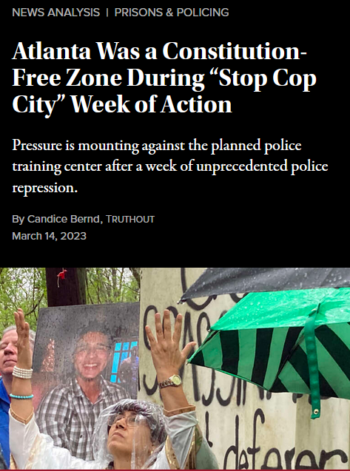Janine Jackson interviewed Defending Rights & Dissent’s Cody Bloomfield about activists being charged with terrorism for the May 19, 2023, episode of CounterSpin. This is a lightly edited transcript.
Janine Jackson: Resistance to the militarized police training complex known as Cop City has been happening since its inception, when Georgia authorities overruled community opinion to create the facility, being built on Atlanta’s South River Forest in the wake of the 2020 Black Lives Matter actions, that includes an area for explosives training and a whole “mock city” for cops to practice suppressing urban protest.

FAIR.org (3/27/23)
In January, police killed the environmental activist known as Tortuguita in a hail of bullets, while they, an autopsy revealed, sat cross-legged with their hands up. The medical examiner ruled it homicide.
There isn’t more you can do to someone protesting your actions than kill them, but authorities are trying to ruin the lives of many others with domestic terrorism charges that call for many years in prison. The state actors behind Cop City, if you somehow can’t see it, are engaging in the overt employment of the very overreaching, harmful powers activists are concerned the facility will foment.
Cody Bloomfield is communications director at Defending Rights & Dissent. They join us now by phone from Washington, DC. Welcome to CounterSpin, Cody Bloomfield!
Cody Bloomfield: Thank you so much for having me, and I’m dismayed by what’s happening in Cop City, but always appreciate the opportunity to bring this news to more folks.
JJ: Absolutely.

CounterSpin (3/24/23)
Well, Atlanta organizer Kamau Franklin told CounterSpin a few weeks back that the land that Cop City is going to be on was promised to the adjacent community, which is 70% Black, as a park area, and there was going to be nature trails and hiking. And then when the idea of Cop City arose from the Atlanta Police Department, the city of Atlanta and the Atlanta Police Foundation, all of those plans were scrapped immediately, without any input from that adjoining community, and they went forward with this idea.
Just to say, people didn’t suddenly start protesting Cop City recently, and they didn’t do it because they saw something on social media. This project has been over and against the community—and the environment, not that they’re separate—since the beginning. So just to say, the context for the bringing of these charges of domestic terrorism against activists, it’s not that activists are suddenly engaged in something new and especially dangerous that is calling for this response.
CB: Yeah, so the occupation of Cop City has been going on for over a year, and we see from the very outset that there has been police resistance to these protests. Very early on, back in 2021, activists told me that during the pandemic, they couldn’t show up in person to city council meetings, because all of the meetings were being held remotely, and so they decided to do a banner action outside of one of the city council member’s homes during the decisions to approve Cop City. They dropped the banner outside of someone’s house, and then they were arrested by police, and they were hauled to jail for the crime of being a pedestrian in the roadway. This was all the way back in 2021.
Then people started camping in the forest, also way back in 2021. The first arrest for domestic terrorism didn’t happen until December 2022, and at that point, people were being arrested for just using the forest. Like in December, there were reports that someone had been arrested who was just going on a hike, who wasn’t part of the occupation.

Intercept (4/20/23)
But in December was when the police crackdown began in earnest, and the people who had been camping for months were arrested for things like sleeping in a hammock with another defendant, [which] was used as evidence, as was First Amendment–protected activities, including being a member of the prison abolition movement. And that’s when the escalated stage of repression really began.
And this repression accelerated in January, when police again stormed the encampment, and murdered Tortuguita, and issued more domestic terrorism arrest warrants. Then there were the subsequent protests over the killing of Tortuguita in Atlanta, and still more people were charged with domestic terrorism.
And all that was a lead-up to a mass mobilization that the activists called for the first week of March, in which many people came from out of state and around the world to protest. But what a lot of the media’s been missing is, they focused on the week of action and saw in the list of arrestees many people from out of state, they’re missing that this out-of-state solidarity was just the tip of the iceberg of months and years of local organizing.
JJ: Right, and I bring it up in part to say that I think that folks who are distanced from it might fall to that line of, if only folks would protest in “the right way,” you know, without breaking anything. And so it’s important to understand that even when folks did things like banner drops and petition drives, they already were being abused and harassed for that style of protest.
But domestic terrorism, that’s deep, that’s serious. How loose are the rules for applying these charges? This is talking about perhaps 20 years in prison for people. There have to be some legal definitions around the charge of domestic terrorism, don’t there?
CB: Yes, and it’s really interesting, actually. Some states don’t even have domestic terrorism statutes, because most crimes that you could prosecute as domestic terrorism, you could also prosecute under existing statutes. Like, the Georgia law was passed in response to Dylann Roof’s massacre in a Black church, but they could have decided at that juncture to prosecute mass murder and prosecute these murders independent of the statute. But they decided that for subsequent events like this, they wanted the domestic terrorism statute, and they passed a very broad statute.

Time (5/4/23)
The Georgia statute defines domestic terrorism as something that endangers critical infrastructure, and this critical infrastructure can be publicly or privately owned. It can be a state or government facility. And as long as someone’s acting with the intent to change or coerce the policy of government, that can count as domestic terrorism.
Now, this statute stands out from the national landscape of domestic terrorism statutes—again, some states don’t even have them, and they seem to be doing fine—and in most other states that have domestic terrorism statutes, the statutes address things like weapons of mass destruction, or they at least require for someone to have died as a result of the alleged terrorism. The Georgia statute doesn’t.
And you might notice, in the part about altering or changing the policy of government, that’s precisely what a lot of protest is intended to do. And protest intended to change the policy of government, that happens to take place in conjunction with critical infrastructure, which they’ve been arguing that Cop City is, opens up activists for being charged with domestic terrorism.
Now, this is a very serious statute. It has a mandatory minimum of five years in prison, going all the way up to a maximum of 35 years in prison. So that alone might be enough to dissuade some activists from showing up to protest. And it’s worth pointing out here that among the people charged with domestic terrorism during the March week of action, some people say that they were only going to attend a music festival, which would have been, at most, misdemeanor trespassing. But when people came back from a march in which they burned bulldozers, which is defined as critical infrastructure that’s there to build Cop City, they went into a crowd, police started to make arrests at random. So some people who by all accounts were not involved in burning the bulldozers, who simply showed up for Stop Cop City solidarity activism and a music festival, were charged with a really serious statute.
And then most were held in jail for over a month, and so then their whole lives were disrupted; they’re faced with this intimidating statute that will take a lot of money and a lot of time to fight, all to dissuade people from becoming activists.
We worry a lot about the chilling effect around these sorts of things in the civil liberties community. It’s often something we talk about in very hypothetical terms, but around this was a rare instance where I saw the chilling effect in practice. There was a group that reached out to me about possibly going down to protest, and I felt like I had to give the heads-up that these domestic terrorism arrests are happening somewhat at random, and the activists ultimately decided not to go down. They decided the risk of protesting was simply too high.
And that’s what charging domestic terrorism is intended to do. It’s intended to make the risk of protesting too high, so that people will just stay home, so that people will stay quiet.

AP (4/13/23)
JJ: Absolutely, and we should note that the harms don’t necessarily have to come from law enforcement or in the form of prison. We have seen people coming back from protests being, for example, kicked out of school. So this is something that is hovering over them, even if they don’t wind up in prison.
CB: Yeah, and recently we’ve heard reports of a loss of access to financial institutions for some of the defendants. So far we’ve heard that Chase Bank, Bank of America, Venmo and US Bank have withheld access to banking for certain domestic terrorism defendants. Also a few people had Airbnb accounts closed. As you mentioned, there was the law student who was unable to return to school. So these charges, even though they have not seen their day in court, have not been proven in court, are already having detrimental effects on the activists.
JJ: I want to bring you back to this “outside agitator” line, which ought to ring bells for lots of folks. To be clear, the public rejection of hyper-policing is being used as a reason for more hyper-policing. And then the fact that people are recognizing, well, this isn’t just Atlanta, this isn’t just Georgia, this is something that can come to me. That is itself being used as more reason.

Truthout (3/26/23)
And your Truthout piece cites the Atlanta police department’s assistant chief saying, “None of those people live here,” speaking of activists:
None of those people live here. They do not have a vested interest in this property, and we show that time and time again. Why is an individual from Los Angeles, California, concerned about a training facility being built in the state of Georgia? And that is why we consider that domestic terrorism.
What the actual heck, there?
CB: Yeah, it’s an extremely striking quote, mostly because it’s just a lie that any part of the statute depends on who’s in-state versus out-of-state. And we look at the history of activism, and activists have always traveled to be where they’re most needed. Throughout the civil rights movement, people frequently crossed state lines. There was the whole Freedom Rider movement.
And whenever there’s international solidarity or national solidarity, we always see this narrative of “outside agitators” being used to discredit the entire movement. It’s seen as mysterious outside actors driving the movement, instead of solidarity that starts where the negative thing is happening, and expands outwards from there.
It’s an incredibly frustrating narrative, and it’s frustrating to see people with state power repeat this narrative, especially when the actual charges have no relation to that.

Cody Bloomfield: “whenever there’s international solidarity or national solidarity, we always see this narrative of ‘outside agitators’ being used to discredit the entire movement.”
JJ: Absolutely, and, you know, it hardly needs saying, Cop City itself is not a wholly local enterprise, is it?
CB: No, Cop City is designed to be a training facility for police across the country, and with the interconnected systems of policing, of intelligence-gathering, we see that Cop City is an everywhere problem, as is all policing. And to charge that only people within a specific mile radius should have anything to say about it is absurd.
JJ: Part of this kind of repression of activity involves suppressing information. And that has involved the overt harassment of reporters, Truthout’s Candice Bernd and others, for example, but it also involves suppressing information itself about what is going on. And I understand you at Defending Rights & Dissent have been working on the transparency front of what’s happening here.
CB: Yeah, so we, from a FOIA release to Pilsen Books in Chicago, we know that, at least from the federal intelligence perspective, they’re very much seeing the Stop Cop City movement as national. When some of the Defend the Atlanta Forest folks went on tour, talking about resistance to Stop Cop City elsewhere, the FBI decided to spy on an anarchist bookstore that was holding the event, and they went through the social media of the event organizers, they went through the social media of the bookstore, and created intelligence files.
And we think that that’s just the tip of the iceberg. There hasn’t been a lot of transparency around what sort of intelligence is being gathered on these activists. Given that they’re charged with domestic terrorism, we expect that quite a lot of evidence has been acquired against them, much of it likely open source and First Amendment-protected. The line in one of the arrest warrant affidavits sent out to a defendant being a member of the prison abolitionist movement gives some hint that they’re likely surveilling a lot of social media. But we don’t know the full extent of surveillance that’s happening here.

Unicorn Riot (4/13/23)
And it’s worth pointing out, if we talk about surveillance, that surveillance on its own can also be a form of repression, especially for vulnerable activists who might be worried about protesting as a person of color, who might be worried about having an existing FBI file, the prospect of being surveilled might alone dissuade them from engaging in activism. But we don’t know the full landscape of that surveillance.
So Defending Rights & Dissent, along with, recently, Project South, have filed a new round of Freedom of Information Act requests, and open-record requests, targeted at looking at just how much the state is surveilling these activists, and what kind of evidence and intelligence is being collected.
And so far we’ve just been stonewalled. They’ve only responded to one query, which was about the Atlanta Police Foundation, and they said, oh, it’s like hundreds of thousands of emails; you need to refine your request. And then we refined our request and haven’t heard from them since.
So we anticipate having to litigate all these requests, which is ridiculous, because under the federal statute, under the state statute, there is a dedicated amount of time in which they’re supposed to give us this information. They’re supposed to be about transparency, and they just haven’t been in this case.

Indiana Herald-Times (5/5/23)
JJ: This is exactly where one would hope for the powers of journalism and independent journalism to move in, to use their heft to get at some of these questions, and yet in terms of larger corporate media—there’s been a ton of terrific independent reporting on this—but larger corporate media….
You know, I saw a piece by Eva Rosenfeld in the Indiana Herald Times in which she was talking about the over-acceptance of the police narrative on certain things, but also asking about big framing questions. Why are media not asking, for example, “Why is a $90 million investment intended to fight crime better spent building a mock city than investing in real communities?”
Too often we see big media zeroing in: Did this person actually break a window? Rather than pulling back and saying, wait a minute, is property more important than human beings? What is actually happening here? I’m wondering what you make of big media’s approach to this story.
CB: Yeah, every second that we spend in the media litigating about whether or not people should have burned down a bulldozer, or whether or not people had the right to go camping, is another moment we’re not spending talking about the substantive issues here. And I think, as soon as the domestic terrorism charges came down, the whole conversation became about whether or not the activists were domestic terrorists, which was a reasonable line of argument, but totally missed the story of an anti-democratic lack of accountability permeating throughout Cop City. From when city council ignored 70% of public comments in opposition to Cop City to recently, when they were charging other people with intimidation of an officer for handing out flyers, trying to do public education, this whole movement to build Cop City has been profoundly undemocratic, and we lose that when we spend time focusing on what crimes protesters may or may not have committed.

Appeal (12/8/21)
JJ: Personally, I want to say that I feel like, you know, “know your rights” is a very important thing for individuals to know, what their rights are in given situations. And yet it’s not so satisfying to say, I know my rights, and they’re being violated right now. We can’t really individualize protest—which it seems like is so much the effort of those who oppose it, to separate us and to say, “do you, Janine Jackson, really want to show up at this protest?”
CB: Yeah, and that’s why, especially in fighting these prosecutions, movement solidarity will be so important. We saw, after the January 20 protests against the inauguration of Trump, an attempt by prosecutors to engage in kind of conspiratorial thinking, and to paint protesters with a broad brush, and protesters were really successful in trying to fight this as a bloc, and insisting on taking cases to trial, where many of them were thrown out. Prosecutors gave up on a lot of the charges, and so that was a success of movement organizing.
And I think here that we have to have that same sort of solidarity. Because you might know your rights, and go to this music festival, and you’re charged with domestic terrorism anyway. It requires solidarity against an overwhelming onslaught of police repression, and that’s something that’s really hard to do. But despite how much the police talk about protesting the right or wrong way, when they’re defining protesting the “wrong way” as being from out of state, and policing the “right way” as shooting unarmed civilians and making arrests at random, the “know your rights” framework kind of goes out of the window, and it has to be about solidarity.
JJ: I just want to end by saying that I really appreciated the emphasis of the headline that Truthout put on your March piece, which was “Atlanta’s ‘Stop Cop City’ Movement Is Spreading Despite Rampant State Repression.” In other words, it’s scary, very scary, what’s happening, but we do recognize that they’re amping up because we’re amping up, and so it isn’t the time to falter.
And I really just appreciated the idea that this is still happening. Folks are scared, and they should be scared, and yet they’re doing it anyway. And the more we stand together, the less scared we need to be.
CB: Yes, it’s been really inspiring to see activists who continue to undertake this fight, who are willing to fight these cases in court, who are willing to look for where Cop City analogs are occurring in their local spaces. Like, there’s people beginning to protest in Pittsburgh. There’s people who are beginning to say, everywhere is Cop City, and looking at the effects of police militarization in communities. And I think what Cop City has done is, despite all the repression, is giving people a sense of how to fight this, and that they can fight this, and for that it’s really important.
JJ: We’ve been speaking with Cody Bloomfield, communications director at Defending Rights & Dissent. They’re online at RightsAndDissent.org. And you can find their piece, “Atlanta’s ‘Stop Cop City’ Movement Is Spreading Despite Rampant State Repression,” at Truthout.org. Cody Bloomfield, thank you so much for joining us this week on CounterSpin.
CB: Thank you.
The post ‘Charging Domestic Terrorism Is Intended to Make the Cost of Protesting Too High’ appeared first on FAIR.
This post was originally published on FAIR.

 Climate activists in Paris blocked the entrance to the building where the TotalEnergies shareholder convention is to be held, the police used tear gas.
Climate activists in Paris blocked the entrance to the building where the TotalEnergies shareholder convention is to be held, the police used tear gas. TO STAY INFORMED SUBSCRIBE
TO STAY INFORMED SUBSCRIBE  (@broseph_stalin)
(@broseph_stalin)  CHAOTIC scenes at
CHAOTIC scenes at 
 #AintAsking (@TheDryhtscipe)
#AintAsking (@TheDryhtscipe)  Federation
Federation 
 (@AnarchistFed)
(@AnarchistFed) 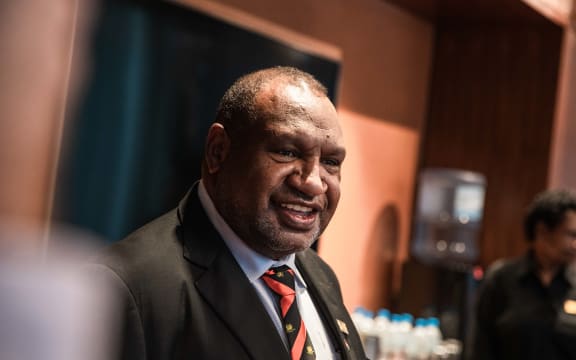
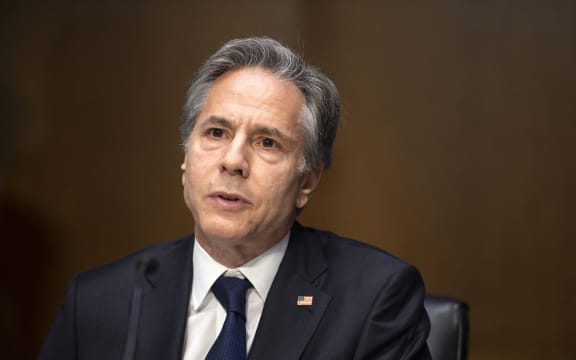
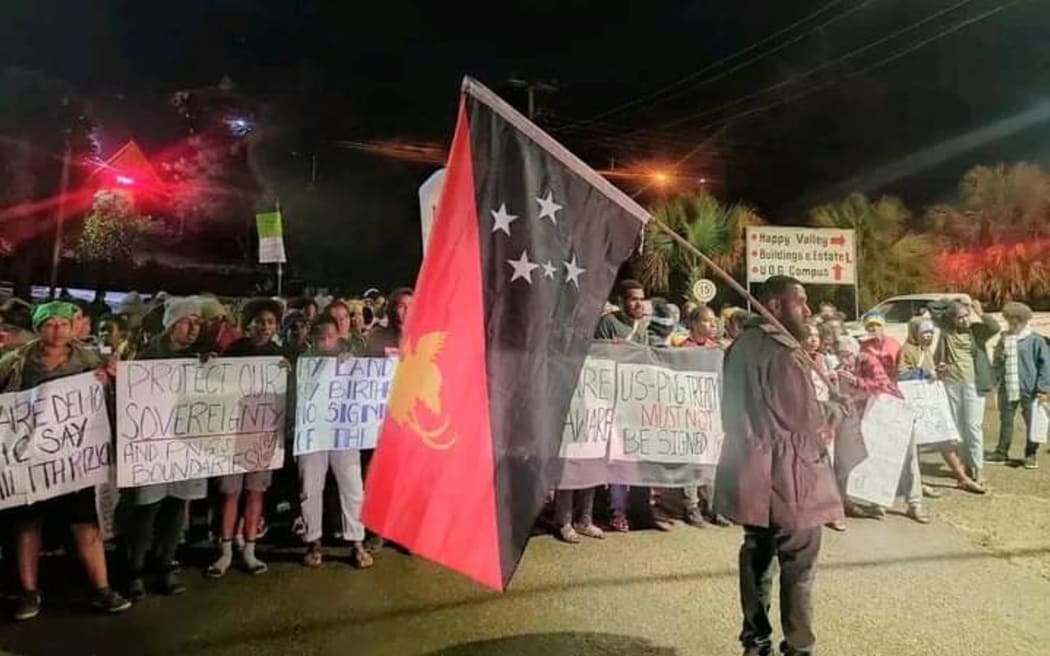
 WATCH | A masterclass by
WATCH | A masterclass by  contributes to enabling Israel’s unchecked occupation & must also be condemned/accounted for
contributes to enabling Israel’s unchecked occupation & must also be condemned/accounted for 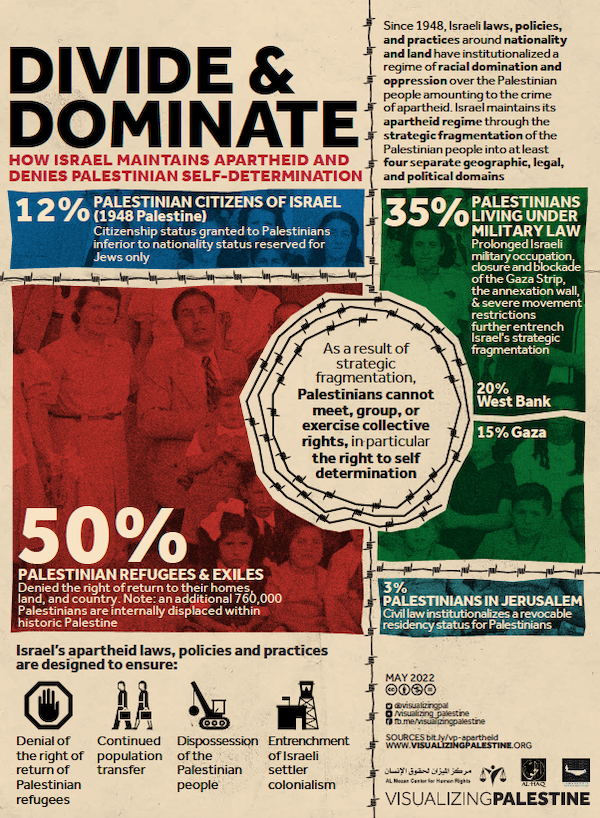










 (@AucklandPride)
(@AucklandPride) 




